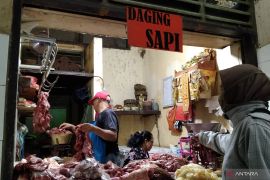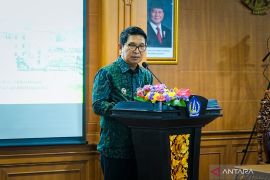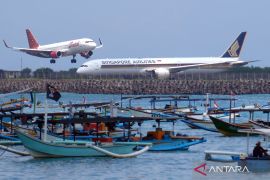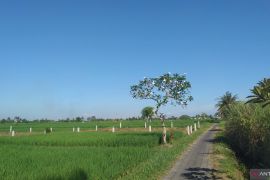Jakarta (Antara Bali) - Finance Minister Chatib Basri said the government continued looking for ways to save to maintain fiscal sustainability in the long term and secure budget implementation.
"We still see chances and they will be discussed at a working committee meeting," he said in a working meeting with the budget committee of the House of Representatives (DPR) to discuss the draft revised budget of 2014 here on Thursday.
The meeting led by budget committee chairman Ahmadi Noor Supit was also attended by minister of national development planning Armida Alisjahbana and Bank Indonesia governor Agus Martowardojo.
Chatib said austerity measures are needed because unless they are taken the current account deficit can reach 2.5 percent of the GDP, while state revenues were limited and subsidy spending can increase sharply up to Rp110 trillion.
"We will take all efforts to maintain the budget. So, while the fiscal conditions are still good, they must be maintained until the next government," he noted.
Chatib said oil subsidy can be saved up to Rp5.95 trillion if consumption is controlled and official cars and cars belonging to mining and forestry companies are not allowed to use subsidized oil.
Other efforts include oil consumption control by BPH Migas, conversion of fuel oil into fuel gas and reduction of fuel nozzles, he added.
"The efforts can save two million kiloliters or around Rp5.95 trillion, so that by the end of the year the quota will be only 46 million kiloliters or below the target of 48 million kiloliters," he said.
Chatib pointed out that austerity measures will also be carried out through cuts in electricity subsidy by Rp8.51 trillion, achieved through raising electricity tariffs for certain household categories and industries in stages once in two months starting in July 2014.
"In connection with that, we ask for support from the House of Representatives (DPR) as the decision to raise the electricity tariff requires a DPR approval and must first be discussed with the House Commission VII," he said.
The minister added that he believed the government can get Rp3.2 trillion in additional funds as the presidential election will only be conducted in one round on July 9.
The funds will come from the excess funds in the General Election Commission (KPU) budget of Rp2.9 trillion and the Election Supervisory Board (Bawaslu) totaling Rp259.9 billion.
Chatib said the government can still possibly get dditional funds from the Tangguh gas project of Rp1.4 trillion, but the income cannot as yet be confirmed as contract negotiation is still going on.
He said the government can get additional funds from the subsidized fuel control program totaling Rp9.83 trillion, but the effectiveness of the program offered by the ministry of energy cannot as yet be confirmed.
The program includes a ban for motorists to buy subsidized fuels on Saturdays and Sundays and other holidays, use of cash to buy subsidized fuels and nozzle buying at gasoline tanks.
Others include reducing work hours at gas stations and banning private cars from using subsidized fuel oils.
"The effectiveness of this program cannot as yet be confirmed and so we cannot as yet tell if Rp9.83 trillion and 2.85 million kiloliters of subsidized oils can be saved through the program," he said.
The meeting led to the decision to bring the draft revised budget to the working committee that will discuss assumptions for macro-economy, revenues, expenditures and funds transfers to regions.
The draft revised budget is Rp1,597.7 trillion, down by Rp69.4 trillion compared to the present budget of Rp1,667.1 trillion.
State expenditures rose to Rp1,848.4 trillion, from Rp1,842.5 trillion or by Rp6.9 trillion.
Meanwhile, the target for budget deficit is Rp251.7 trillion or 2.5 percent of the GDP, higher than the target of Rp175.4 trillion or 1.69 percent of GDP in the current budget.
The lower target of state revenues is due to a reduction in tax revenues at the draft budget by Rp48.3 trillion.
The target of state revenues is Rp1,232.1 trillion, down from Rp1,280.4 trillion in the current budget.
The expenditures for subsidized fuel oils are up by Rp74.3 trillion to Rp285 trillion, from Rp210.7 trillion in the current budget. Electricity subsidy is set at Rp107.1 trillion, up Rp35.7 trillion from Rp71.4 trillion in the current budget.
To prevent subsidy expenditures from soaring to Rp110 trillion, the government plans to cut spending in 86 ministries/state institutions up to Rp100 trillion and this will be discussed in the House of Representatives.
The basic macro-economic assumptions for the draft revised budget include economic growth of 5.5 percent, inflation of 5 .3 percent, rupiah exchange rate of Rp11,700 per US dollar and the interest rate of 6.0 percent for three-month state securities.
The Indonesian Crude Price, meanwhile, is set at US$105 per barrel, while target for oil lifting is 818,000 barrels a day and that of gas lifting is 1,224,000 barrels of oil equivalent per day.(WDY)









